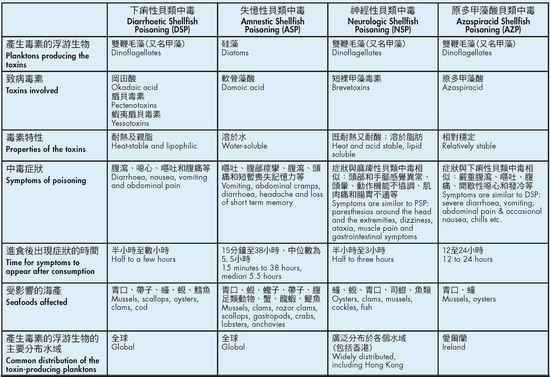
Food Safety Focus (71st Issue, June 2012) – Food Safety Platform
More on Shellfish Poisoning Toxins
Reported by Mr. Arthur YAU, Scientific Officer,
Risk Assessment Section,
Centre for Food Safety
This is the last article of a series of three that focuses on marine toxins originating from minute organisms (e.g. planktons) which can affect seafood safety. In the last issue, we discussed about the paralytic shellfish poisoning (PSP). We will talk about four other shellfish poisoning toxins in this article.
Other Shellfish Poisoning Toxins
Other than the paralytic shellfish poisoning that we discussed in the last issue, there are four other shellfish poisoning toxins that are more commonly known to the shellfish trade, scientifi c and regulatory communities worldwide. They are namely diarrhoetic shellfish poisoning (DSP), amnestic shellfish poisoning (ASP), neurologic shellfish poisoning (NSP) and azaspiracid shellfish poisoning (AZP).

Table 1: Features of DSP, ASP, NSP and AZP toxins
Ways to Reduce the Chance of Shellfish Poisoning
Although depuration of harvested shellfish (the process of purifying shellfish in clean water under specific conditions) is practised in certain regions, it does not guarantee shellfish are free of toxins as the effect of depuration is affected by numerous factors, including the species of shellfish and toxins involved, as well as the condition and intended effect of depuration. Regular monitoring of shellfish farming and harvesting areas are preventive measures to control the effect of shellfish poisoning toxins in shellfish harvested for human consumption. The trade should source shellfish from reliable suppliers and avoid obtaining shellfish collected from areas that have been affected by shellfish poisoning organisms.
Consumers should avoid consuming the digestive and reproductive glands of shellfish where much of the toxins often concentrate. Where possible, all organs of bivalves should be discarded and only the adductor muscles should be consumed. The cooking liquid should also be abandoned. One should always buy shellfish from reliable sources, and scrub and clean the shells thoroughly before cooking. Overindulgence in shellfish should be avoided.


